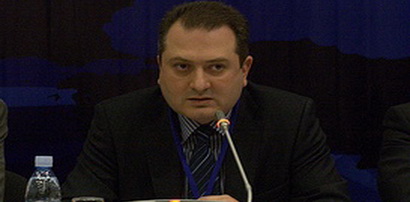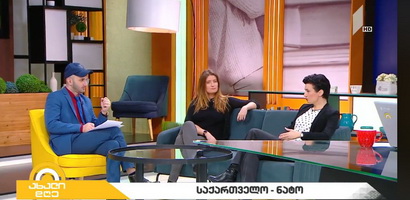 It would be more difficult to start such a war like in 2008, when Russia attacked Georgia since now there are some prevention mechanisms in place. Furthermore, the Russian Georgian war only increased Georgians' aspirations to join NATO, Tengiz Pkhaladze, the Chairperson of the International Centre for Geopolitical Studies in Georgia said to the Lithuania Tribune. Mr. Pkhaladze is also convinced that relationship between Lithuania and Georgia has evolved from being based on personal friendships to institutionalized bilateral relations. Read the interview which was conducted on 15 September in Riga, during Riga Conference 2012.
It would be more difficult to start such a war like in 2008, when Russia attacked Georgia since now there are some prevention mechanisms in place. Furthermore, the Russian Georgian war only increased Georgians' aspirations to join NATO, Tengiz Pkhaladze, the Chairperson of the International Centre for Geopolitical Studies in Georgia said to the Lithuania Tribune. Mr. Pkhaladze is also convinced that relationship between Lithuania and Georgia has evolved from being based on personal friendships to institutionalized bilateral relations. Read the interview which was conducted on 15 September in Riga, during Riga Conference 2012.
We would like to ask you about to the Russian-Georgian war of 2008. This conflict escalated quickly and it all was very sudden for us here in the Baltic States. Would you say that Georgia feels let down by its Western allies? Do you feel that NATO could have done more for Georgia in this war?
Tengiz Pkhaladze:
I think that the prevention mechanism is one of the important and significant questions here. My feeling in 2008 was that there was no such mechanism, which should work like an alarm, a wake up call.
Let us remember how 2008 started, when Mr. Putin announced the doctrine of "asymmetric answer". Nobody paid enough attention to this. If we look at the European or North-Atlantic security systems, there are strong disagreements between the key players: EU/USA and Russia, but despite this, the probability of a direct conflict is very low. "Asymmetric answer" means that the probability of conflict increases in a different region, in so-called 'weak regions' like ours.
The same happened when Russia established direct relations with the so-called governments of the breakaway regions of Abkhazia and Ossetia; when they rebuilt their military infrastructure and so on.
I think the probation mechanism today is much stronger than it was in 2008, first of all because we now have an understanding of what happened, so we try to avoid the same mistakes, and by 'we' I am talking of the European countries.
When Russia carried out drills in the Caucasus, we saw support from NATO and the EU. For example, take the visit of six foreign EU ministers a few weeks ago.
Clearly, Russia's main goal in the war was to stop Georgia's Euro-Atlantic aspirations, but they were unsuccessful, as we had the Lisbon and Chicago summits' declarations, and we are moving forward. Therefore, I think that the probation mechanism is much stronger nowadays. At least we understand what is happening.
Did the war increase or reduce the Georgian population's aspiration to join NATO?
Actually, the latest opinion polls show it is the same, at about 80% of the population. The first reaction was of shock of course, because it was not just some kind of military operation, it was war. Perhaps there was disappointment for a few months, and we still have refugees and internally displaced people, but we remember the support of our European friends, we remember the visits of six presidents that came in a very dangerous period, and thanks to this support we kept our statehood and our country.
The Georgian population believes that the only way to preserve statehood is the way to NATO.
There is another conflict glooming in the Caucasus as tension grows between Azerbaijan and Armenia. How does this conflict affect Georgia's relations with both countries? Who do you support, how do you position yourselves in regards to this?
The current situation is very dangerous; the summer was very tense, with incidents happening on a daily basis. Now, Georgia supports peace, but actually, when talking about the conflicts in South Caucasus in general, there is one key player, and that is Russia, which is involved in different ways: in Georgia it is an occupant, and in Karabakh case it is a peacekeeper, but it is anyway a key player.
Everyone understands that the Russian Federation is interested in maintaining control over the tensions, and it will do anything to use this because the South Caucasus is part of what Russia calls their privileged interest.
Georgia is not a post-Soviet country anymore; it is a democratic, Western-oriented society. Azerbaijan is one of the richest countries in the South Caucasus; it has enough resources and does not depend on Russia either. Nowadays the only way Russia can exert control over the two countries is through conflict.
Both Azerbaijan and Armenia are interested in a peaceful resolution to the conflict, but Armenia is landlocked and enclosed, on the one side by Turkey, and on the other by Azerbaijan. Besides, there is a Russian military base in Gyumri (Armenia), and this base is Russia's mechanism for influencing and controlling conflict in the region.
To solve the conflict in a peaceful way, first of all, there should be a common understanding that we are all on the same boat. For instance, take the Baltic countries, which understood they are on the same boat and chose the same direction. Developing and protecting shared values is key here.
Unfortunately, we have a different situation in the South Caucasus, but if we reach such understanding, that Turkey, Azerbaijan and Armenia are not enemies, that all have common interests, and that this conflict is really only the interest of Moscow and the Kremlin, then things will be different and the geopolitical situation in the South Caucasus will change, there is no other way.
Lithuania and Georgia had cooperated closely, at least in the public eye, but it seems as though once the presidential elections took place in Lithuania, the situation changed. Lithuania, however, says the cooperation is still there, and that Lithuania supports Georgia's NATO membership. Would you agree with this, is the cooperation as strong as it was?
Yes, actually I believe that we have already achieved a very important level, i.e. we have reached a strategic level in which the relations between the two countries do not depend on individual persons.
Relations between persons are of course very important, but I am talking about strategic relations; we already have institutionalized bilateral relations with Lithuania, whose support is of vital significance for Georgia.
Lithuania and Georgia have many things in common, both know what it is to be post-Soviet countries, both have Russia as a neighbor, both share Euro-Atlantic aspirations, etc. We also have a somewhat common mentality.
Lithuania understands Georgia's current political reality much better than other countries, and it has shown this, for instance, by talking about our occupation; by supporting status-neutral documents, which is a key point of our state policy towards occupied territories; by supporting Georgia's EU aspirations and so on, precisely because the two countries have very strong ties.
Exclusive
-
Tengiz Pkhaladze at TRT Word's TV Show: The Battle for Nagorno-Karabakh Armenia and Azerbaijan are again on the brink of war. The fighting...
-
Interview with Giorgi Kekelidze. Public Broadcaster www.facebook.com
-
Current goings-on in Government puts the publics' political maturity to the test Regarding the objects and tasks of the so called demarcation policy...
- 1
- 2
